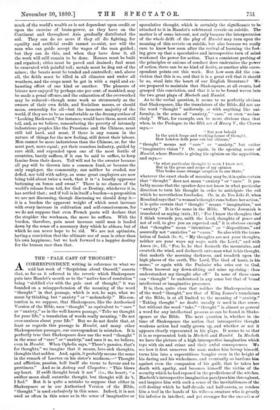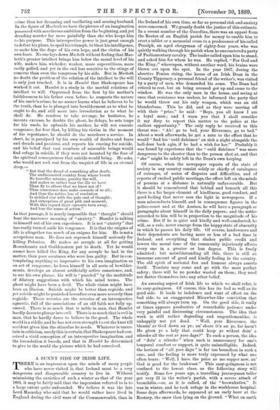THE "PALE CAST OF THOUGHT."
ACORRESPONDENT, writing in reference to what we said last week of "Scepticism about Oneself," asserts that, so far as it referred to the reverie which Shakespeare puts into Hamlet's mouth as to the "native hue of resolution" being " sicklied o'er with the pale cast of thought," it was founded on a misapprehension of the meaning of the word " thought " in that passage, which is not, he says, what we mean by thinking, but " anxiety " or "melancholy." His con- tention is, we suppose, that Shakespeare, like the Authorised Version of the Bible, uses "thought" as equivalent to " care " or "anxiety," as in the well-known passage, "Take no thought for your life," a translation of words really meaning, "Be not over-anxious about your life." But we do not doubt that, at least as regards this passage in Hamlet, and many other Shakespearian passages, our correspondent is mistaken. It is perfectly true that Shakespeare does use the word " thought " in the sense of "care" or "anxiety," and uses it so, we believe, even in Hamlet. When Ophelia says, "There's pansies, that's for thoughts," we imagine that it means, love-sick thoughts, thoughts that sadden. And, again, it probably means the same in the remark of Laertes on his sister's madness,—" Thought and affliction, passion, hell itself she turns to favour and to prettiness." And so in Antony and Cleopatra : "This blows my heart. If swift thought break it not" (i.e., the heart), "a swifter mean shall outstrike thought, but thought will do 't, I reel." But it is quite a mistake to suppose that either in Shakespeare or in' our Authorised Version of the Bible, " thought " is used exclusively in this sense. Indeed, it is not used as often in this sense as in the sense of imaginative or
speculative thought, which is certainly the significance to be attached to it in Hamlet's celebrated reverie on suicide. The matter is of some interest, not only because the interpretation of the whole drift of the play of Hamlet may tarn upon the meaning of this reverie on suicide, but also because we realty care to know how soon after the revival of learning the feel- ing grew up that a speculative and introspective turn of mind weakened the power for action. That a consistent probing of the principles or axioms of conduct does undermine the power of action, there can be no kind of doubt, as another able corre- spondent points out this week. But how soon did the con- viction that this is so, and that it is a great evil that it should be so, steal into the heart of our English literature P We are prepared to maintain that Shakespeare, at all events, had grasped this conviction, and that it is to be found woven into the two great plays of Macbeth and Hamlet.
As to the verbal question, it seems to us perfectly obvious that Shakespeare, like the translators of the Bible, did not use the word " thought " uniformly, or with anything like uni- formity, in the sense of "anxiety," "care," or even " melan- choly." What, for example, can be more obvious than that when, in the Prologue to the fifth act of Henry V., the Chorus says,—
" But now behold
In the quick forge and working-house of thought, How London doth pour out her citizens," " thought " means not " care " or "anxiety," but rather "imaginative vision"? Or, again, in the opening scene of
Hamlet, where Horatio is giving his opinion on the apparition, and says,— "In what particular thought to work I know not, But in the gross and scope of my opinion
This bodes some strange eruption to our State," whatever the exact shade of meaning may be, it is quite certain that "thought" does not mean " anxiety " or "care." It pro- bably means that the speaker does not know in what particular direction to turn his thought in order to anticipate the evil which he nevertheless forebodes. Or, in As You Like It, when
Rosalind says that "a woman's thought runs before her action," it is quite certain that" thought" means "imagination," not "anxiety." It is the same in the Bible. Where Jeremiah is translated as saying (xxix., 11), "For I know the thoughts that I think towards you, saith the Lord, thoughts of peace and not of evil, to give you an expected end," it is obvious enough that " thoughts " mean " intentions " or "dispositions," and assuredly not " anxieties " or "cares." So also with the trans- lation of Isaiah (1v. 8), "My thoughts are not your thoughts, neither are your ways my ways, saith the Lord ;" and with Amos (iv., 13), For, lo, be that formeth the mountains, and createth the wind, and declareth unto man what is his thought, that maketh the morning darkness, and treatleth upon the high places of the earth, The Lord, The God of hosts, is his
name," or again with the Psalmist who cries out to God, "Thou knowest my down-sitting and mine up-rising : thou understandest my thought afar off." In none of these cases can "thought" be understood in any sense but that of broad intellectual or imaginative processes.
It is, then, quite clear that neither the Shakespearian use of the word " thought," nor that of King James's translators of the Bible, is at all limited to the meaning of "anxiety." "Taking thought" no doubt usually is used in that sense; but without the word "take," " thought " is almost as general a word for any intellectual process as can be found in Shake-
speare or the Bible. The next question is, whether in the time of Shakespeare the notion that introspective thought weakens action had really grown up, and whether or not it appears clearly represented in his plays. It seems to us that it is so represented both in Macbeth and Hamlet. In Macbeth we have the picture of a high introspective imagination which toys with sin and crime and their awful consequences. We see how it first unnerves the man, makes him betray himself, turns him into a superstitious bungler even in the height of his daring and his wickedness, and eventually so hardens him
against even the companion of his guilt, that he takes her death with apathy, and becomes himself the victim of the security which he had reposed in the predictions of the witches. Macbeth's introspective imagination paralyses him throughout, and inspires him with such a sense of the inevitableness of the evil destiny which he half-dreads and half-covets, as renders him a tool in the hands of his wife—a creature who is greatly his inferior in intellect, and yet stronger for the execution of crime than her dreaming and vacillating and musing husband. In the figure of Macbeth we have the picture of an imagination possessed with murderous ambition from the beginning, and yet dreading murder far more painfully than she who keeps him to his purpose. This introspective power is just great enough to defeat his plans, to spoil his triumph, to blast his intelligence, to make him the dupe of his own hope, and the victim of his own fears. No one lays down Macbeth without feeling that Mac- beth's greater intellect brings him below the moral level of his wife, makes him wickeder, weaker, more superstitious, more easily gulled, and yet in the end less sensitive to the stings of remorse than even the temptress by his side. But in Macbeth no doubt the problem of the relation of the intellect to the will is only just touched. It is in Hamlet that Shakespeare has worked it out. Hamlet is a study in the morbid relations of intellect to will. Oppressed from the first by his mother's faithlessness to his father even before he suspects the nature of his uncle's crime, he no sooner learns what he believes to be the truth, than he is plunged into bewilderment as to what he ought to do, and still more into irresolution as to what he shall do. He resolves to take revenge, he hesitates, he invents excuses, he doubts the ghost, he delays, he sets traps for his uncle, he upbraids his mother, he will not execute vengeance, for fear that, by killing his victim in the moment of his repentance, he should do the murderer a service. In short, he is paralysed by his own wealth of doubts and fears and dreads and passions, and repeats his craving for suicide, and his belief that vast numbers of miserable beings would find refuge in suicide, if they were not haunted by the fear of the spiritual consequences that suicide would bring. He asks, who would not seek rest from the unquiet of life in an eternal sleep,—
" But that the dread of something after death,
The undiscovered country from whose bourn No traveller returns, puzzles the will, And makes us rather bear the ills we have Than fly to others that we know not of?
Thus conscience does make cowards of us all ; And thus the native hue of resolution Is sicklied o'er with the pale cast of thought ; And enterprises of great pith and moment, With this regard their currents turn away, And lose the name of action."
In that passage, it is nearly impossible that " thought " should bear the narrower meaning of "anxiety.". Hamlet is talking
to himself out of his own experience. It is not "anxiety" that has really turned aside his vengeance. It is that the enigma of life is altogether too much of an enigma for him. He is not a scrupulous man. He does not reproach himself seriously for killing Polonins. He makes no scruple at all for getting Rosenkrantz and Guildenstern put to death. Yet he would sooner have killed the King, for any scruple he had in the matter, than poor creatures who were less guilty. But in con- templating anything so impressive to his own imagination as an act of vengeance, he loses himself in all sorts of bewilder- ments, develops an almost artificially active conscience, and, to use his own phrase, his will is "puzzled" by the multitude of dilatory suggestions with which his mind teems. The ghost might have been a devil. The whole vision might have been an illusion. Suicide might be better than regicide, and yet suicide might be punished hereafter even more severely than regicide. These reveries are the reveries of an introspective agnostic, full of the associations of an old faith not fully up- rooted. There is so much that is noble in man, that Hamlet hardly dares to plunge into evil. There is so much that is evil in man, that he hardly dares to believe in the good. The whole world is a riddle, and he has not even strength to cut the knot till accident gives him the stimulus he needs. Whatever is uncer- tain in criticism, surely this is certain, that Shakespeare had con- ceived a vivid conception of an introspective imagination, and the irresolution it breeds, and that in Hamlet he determined to give to the world the picture which he had conceived.







































 Previous page
Previous page